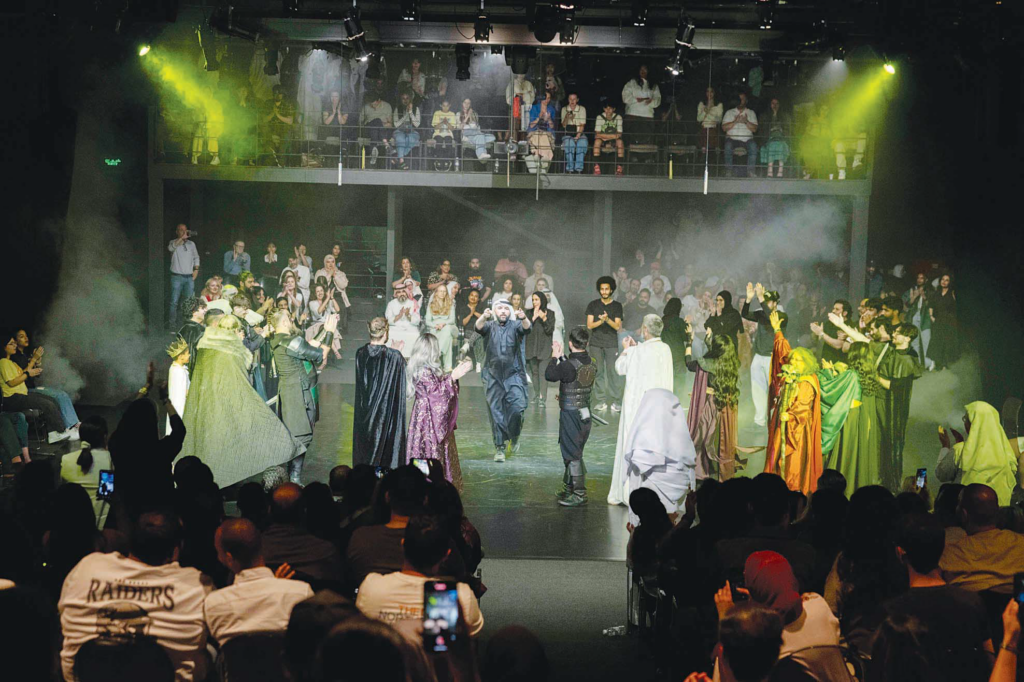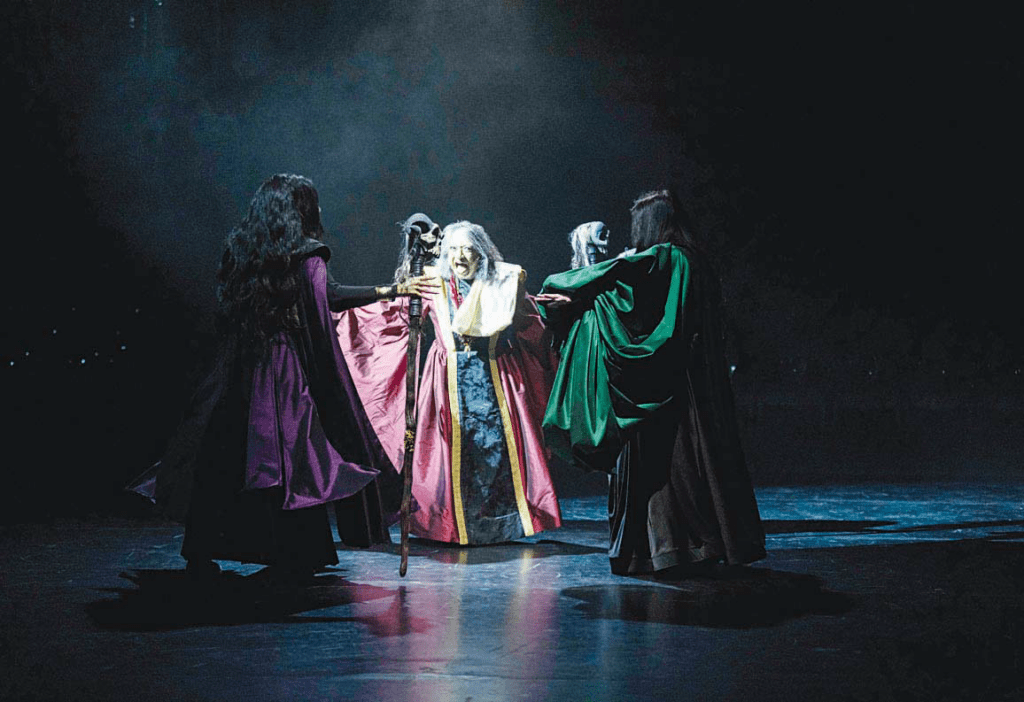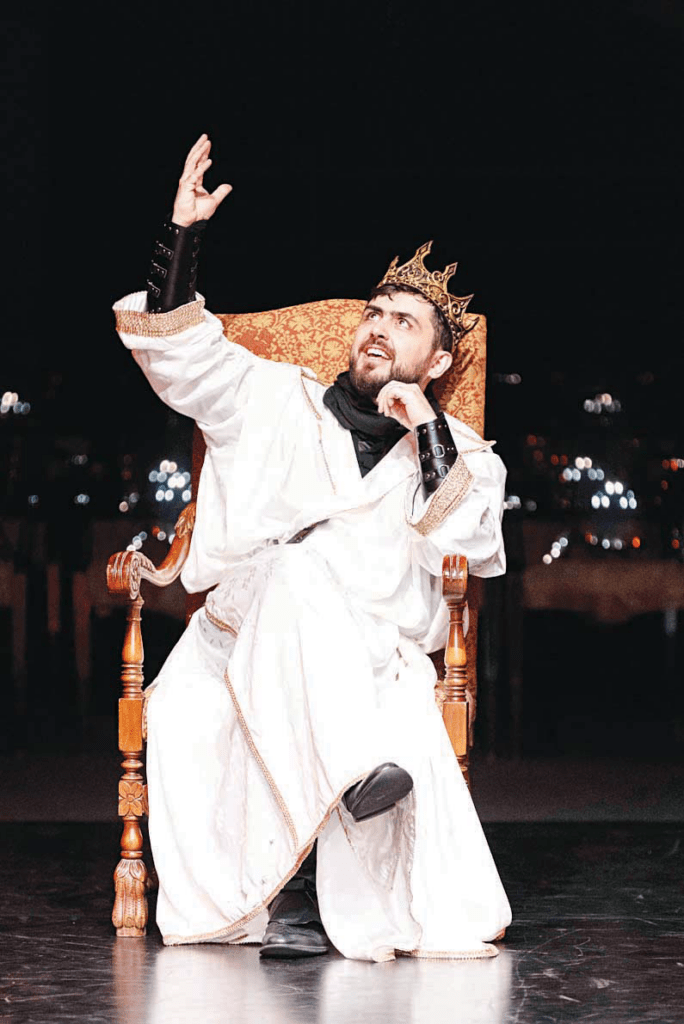21/04/2024
21/04/2024
‘Fair is Foul and Foul is Fair’ announce the witches in the bard’s shortest play, which was first staged in 1606 and which still resonates after four hundred years at Dar Al Athar Al Islamiyyah’s Yarmouk Cultural Centre. On the 19th and 20th of April, Alison Shan Price MBE presented Macbeth, directed by the gifted Hamad Al Jenaie, as part of the 28th Cultural Season of the Dar Al Athar Al Islamiyyah and the Kuwait National Council for Culture Arts and Letters at the DAI Yarmouk Cultural Centre (YCC). I have covered lectures, concerts, and events for Dar Al Athar Al Islamiyyah on and off for over two decades, but I can say with conviction that I have never seen such an overwhelming response to theatre as I saw at the show’s premiere. The audience spilled over the seating area of YCC, with people huddling on the floor vying for a good angle of the stage. And the audience was not disappointed. Hamad Al Jenaie and his stellar cast delivered on all fronts. “It has been a pleasure to be a producer of Hamad Al Jenaie’s productions, and ‘Macbeth’ is no exception,” said Alison Shan Price MBE, noted theatre personality and the show’s producer.” It is the first English production of this Shakespearean classic to be created by a Kuwaiti artistic director in the world, and the first production in Kuwait to be performed ‘in the round’.

Multicultural
His choice of an exceptional multicultural cast headed by Kuwaiti actor Nader Abdullah in the lead role and theme of Scottish folklore raised the over brimming audience to its feet.” Hamad Al Jenaie’s retelling of Shakespeare is imaginative and expressive. The talented cast did justice to Shakespeare’s challenges and produced a focused and selfassured presentation. The eerie and potent Lady Macbeth (Louise Durnin), paired with a powerful performance by the lead titular character (Nader Abdullah), creates an ambitious retelling of the play that continues to resonate with people despite the passage of time. Al Jenaie’s journey with Shakespeare began in 2019 with Hamlet. He followed it up with The Tempest in 2022, and Macbeth in 2024. When asked how he tried to reimagine Macbeth, Al Jenaie said, “Shakespeare is one of the most famous playwrights of all time, and Macbeth is considered one of his greatest tragedies. To reimagine Macbeth, you need to find the absolute core of the story.As a story, it has every element of what a theatre should be. It is just getting the right team, getting the right cast, and having the right production on its feet. I’m thrilled that we were able to achieve that.” There are many challenges to staging Shakespeare right, from the length of the soliloquies to finding the right cast. Talking about what makes Shakespeare unique, Al Jenaie says,” Shakespeare is universal. Shakespeare is challenging, but the audience’s participation and love of Shakespeare keep it relevant. And they grew with Shakespeare. That’s why I believe Shakespeare is the starting point of getting the audience interested in the classics.

Attention
In 2019, we set Hamlet in a modern-day mental asylum, yet it grabbed attention. The Tempest was set in a classroom, and then the classroom became an island, adding relevance. Macbeth is set in a much darker time of its era, yet it engages the audience. I think Shakespeare is universal. And it grabs people’s attention. I believe it’s very commercial and very popular as well.” Nader Abdullah, the lead actor of Macbeth, agrees that Shakespeare is challenging. “One challenge is finding people willing and able to engage with Shakespeare and translate it to stage,” he shares. “I am fortunate to have studied how to interpret the text for actors and help them find their characters and present them in an understandable way to the audience.”
Nader Abdullah is as compelling as Macbeth. Abdullah’s interpretation of Aristotle’s tragic hero, which Shakespeare’s Macbeth captures so well, goes beyond the role’s traditional physicality and concentrates on the psychology and moral dimension. Abdullah shares how he prepared for the show: “One scene at a time. The characters’ motivations are embedded in the text, so the more we work on the scenes, the more we can draw the characters off the page and onto the stage.” The irrepressible Laila Al Qadhi, who plays one of the three weird sisters, eloquently verbalises the relevance of Shakespeare in contemporary times in these words,“ Some human qualities remain timeless. Desire and ambition have existed for a long time and will continue till the end of time without change. The confl icts Macbeth faces are as relevant today as they were in Shakespeare’s time. People identify with Macbeth’s ambition and the confl ict he faces between good and evil, between right and wrong.

Most today continue to feel the pressure of greed, jealousy, envy, and a desire to usurp a position if it leads to power. These aspects of the human psyche and nature make this play timeless.” Nader Abdullah agrees. He says, “Shakespeare’s works are timeless and enduring because at the core they are about the human experience, and that transcends time and place. Our Macbeth is a man struggling with great personal tragedy and the consequences of unchecked ambition, resulting in an even greater tragedy.” Laila Al Qadhi, along with Sarah Khabbaz and Mariam Al Shimmari, plays agents of chaos in the play. “An agent of çhaoscan assist in bringing balance,” explains Al Qadhi. “The universe needs a balance, a kind of delicate dance of creation and destructionand the cycle goes on. An agent of chaos can often bring a much-needed balance by provoking traits lurking in the background,” she says. “Personally, playing an ágent of chaos (a witch) in the play Macbeth helped me understand the darker power within myself. At my age, I have had many situations when choices had to be made, and playing this role made me grateful for having chosen to be an ágent of peace and good’, For in the end, Shakespeare shows his audience that victory is always with the ‘just’. Regardless of how long it takes and how many may be victims of those more powerful at a given time, justice will prevail.”
Louise Durnin plays the iconic Lady Macbeth with aplomb. Her interpretation of one of Shakespeare’s most lethally charismatic characters is praiseworthy. According to Durnin, Lady Macbeth is not as sinister or bloodthirsty as people perceive her; instead, she acts out of love for her husband and seeks completion in his ambition for himself. Lady Macbeth is perhaps the most powerful character in the play, challenging the traditional gender roles of her time. Louis Durnin agrees. “ I agree that Lady Macbeth challenges traditional gender roles within the context of the play. Her strong desire for power and influence over Macbeth, especially in persuading him to commit regicide, demonstrates how she challenges traditional gender roles.
Character
Lady Macbeth’s ambition and willingness to use violence go against the societal expectations of a woman during her time. Her character exhibits masculine traits such as assertiveness, ruthlessness, and a commanding presence, which were not commonly associated with women then. Overall, Lady Macbeth is a complex character who defies the boundaries of what was expected from a woman in her society.” It is challenging to reprise a role as tricky as Lady Macbeth, but Louise Durnin navigated the challenges comfortably. The woman who begins the play by praying for hardness and cruelty is destroyed by the return of the conscience she thought she had banished. “ I had to try and navigate her intense ambition, moral conflict, and descent into madness,” says Durnin. “She undergoes a significant transformation throughout the play, so conveying that journey requires a deep understanding of her motivations and inner turmoil. I have tried to capture her commanding presence and manipulative nature while maintaining a humanising touch that reveals her vulnerability and fear.” With his arresting presence, Brian Mclaughlin played Banquo, Macbeth’s friend, who also tasted his betrayal. After he is killed, Banquo adopts his ghostly form, becoming one of the most famous ghosts in English literature.
Speaking of Hamlet’s timelessness, Mclaughlin says, “Of all of Shakespeare’s plays, Macbeth is my favourite, and it has been since I was introduced to it in high school. It was the Game of Thrones of the Seventeen Hundred with its characters and themes of betrayal, guilt, envy, manipulation, ambition, paranoia, revenge, honour, and love. Human nature has not changed since Shakespeare’s time, and these themes can be seen reflected not only in today’s pop culture but in the real world itself. Just as for Macbeth, power and the pursuit of power can corrupt us all.” Hamad Al Jenaie’s interpretation of Macbeth does not disappoint. The music, costume, cast, and atmosphere is spot on. It is an ambitious retelling. A few months ago, while staging Macbeth in the United Kingdom, Simon Godwin, the director, chose to use headphones for the audience to channel the sound of the play and create an immersive experience. In the future, productions in Kuwait may consider that option. Imagine every creak and whimper of the Shakespearean stage being magnified, adding to the already sinister and eerie.
By Chaitali B. Roy
Special to the Arab Times


